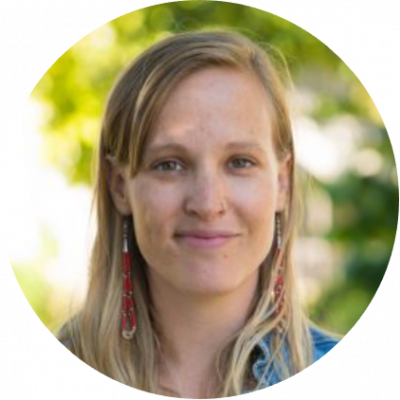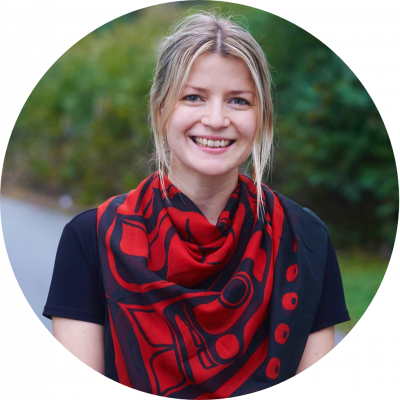Indigenous Peoples and communities have been stewards of their lands and waters for millennia, and as a result, have developed deep place-based knowledge systems. It is only recently, however, that Western scientists are beginning to recognize that the knowledge and wisdom held by Indigenous Peoples is at once scientific, spiritual, holistic, and action-oriented. While this recognition is long overdue, it is also pressuring Indigenous Peoples to use their lands and knowledge systems to solve environmental crises that are not of their making. The open data movement is one such pressure.

©Andrea Reid
We sat down with two members of the Centre for Indigenous Fisheries – Dr. Sara Cannon (settler), postdoctoral research fellow at the IOF and lead author of the study, and Dr. Andrea Reid (Nisga’a Nation), assistant professor at UBC’s Institute for the Oceans and Fisheries and co-author of the study, to discuss Indigenous data sovereignty.
Sara Cannon
How have non-Indigenous scientists/researchers historically treated Indigenous data?
In North America, non-Indigenous scientists/researchers have a history of treating Indigenous knowledge holders as research subjects, driving exploitation, mistrust, power imbalances, and inequality that persist today. For example, non-Indigenous researchers have used Indigenous data without properly attributing or acknowledging it as coming from Indigenous Peoples, lands, and waters; Indigenous data have been stolen and used to enrich non-Indigenous peoples and Nations through bioprospecting and biopiracy; non-Indigenous people have interpreted Indigenous data without cultural or contextual knowledge; and non-Indigenous researchers have claimed authority over Indigenous Peoples through their interpretations of Indigenous data.
 Today, there is a deep need to safeguard Indigenous data from misuse. While non-Indigenous scientists and Crown agencies are increasingly appreciating the inherent value of Indigenous knowledge systems, there is still a tendency to view Indigenous data (including Indigenous knowledge) through the lens of Western science, for example as extractable, reducible, and “usable” in quantitative formats, leading to the exclusion of knowledge holders. Western-trained scientists may not recognize the holistic nature of Indigenous knowledge systems and may attempt to extract pieces of the whole to make convenient scientific arguments.
Today, there is a deep need to safeguard Indigenous data from misuse. While non-Indigenous scientists and Crown agencies are increasingly appreciating the inherent value of Indigenous knowledge systems, there is still a tendency to view Indigenous data (including Indigenous knowledge) through the lens of Western science, for example as extractable, reducible, and “usable” in quantitative formats, leading to the exclusion of knowledge holders. Western-trained scientists may not recognize the holistic nature of Indigenous knowledge systems and may attempt to extract pieces of the whole to make convenient scientific arguments.
As a result, Indigenous data may be misinterpreted, utilized against Indigenous Peoples, or disregarded when it does not serve the private interests of the Canadian government. Indigenous data may also be used in ways that violate cultural protocols; for example, some forms of Indigenous data cannot be shared with all people and all contexts, and many come with specific responsibilities. In addition, Indigenous knowledge systems and worldviews are encoded, practiced, and passed on through Indigenous languages, but research projects designed, conducted, and governed through Indigenous languages are vastly eclipsed and outnumbered by those carried out in English, reflecting the far reach and deep impacts of linguistic imperialism and colonialism. Indigenous knowledge systems are almost certainly oversimplified when incorporated into Western scientific research and translated into English, further undermining the acquisition of accurate Indigenous data.
As a non-Indigenous scientist, how did you situate yourself within this discourse?
I had a very specific role in this paper. I was hired by the Watershed Futures Initiative at Simon Fraser University to draft the workshop materials alongside the webinar contributors, all of whom were First Nations knowledge holders or technical staff working for First Nations. My job was to take on as much of the labour as I could to create resources from all that was shared during the workshop. I worked closely with the contributors to ensure that the outputs accurately represented all that they shared and would be useful to them.
I reflected critically on my positionality during the drafting of this manuscript to make sure that my experiences as a non-Indigenous researcher, and the biases that attest to the privileges I have been afforded as a white settler, did not have a large influence on the descriptions of outputs from the webinar. I was, and still am, accountable to the contributors, who remain the owners of all the knowledge shared during the workshop and presented in the paper and reports. I’m incredibly grateful for the opportunity to collaborate with and learn from all of the contributors.
What were the results?
We used wild Pacific salmon in British Columbia to demonstrate how effective conservation requires that practitioners explicitly incorporate Indigenous data sovereignty. Indigenous knowledge systems are incredibly powerful and could help shape approaches to address the impacts of cumulative effects and climate change on salmon-bearing ecosystems in BC, but Indigenous knowledge cannot be separated from the people who steward that knowledge. To help facilitate a shift towards incorporating Indigenous data sovereignty into research practices, the contributors produced a list of ideas and resources for First Nations to consider as they assert sovereignty over their data, as well as clear, related recommendations for non-Indigenous researchers working on Indigenous territories. We hope that this manuscript will facilitate much-needed consideration of Indigenous data sovereignty in fisheries science and conservation within Canada and beyond.
Andrea Reid

As an Indigenous scientist, how do you view Indigenous data sovereignty?
Indigenous data sovereignty is our right to govern our own data, on our own terms.
Why is Indigenous data sovereignty so important?
It is critical for many reasons – one major one being that this movement helps shift the narrative around Indigenous Peoples being passive participants in or subjects of research, which has a track record of causing serious harms, to an approach to research where we are engaged as true partners and co-investigators.
Can you explain what the salmon case study was?
It’s critical to recognize how much Indigenous knowledge and data were relied upon by colonizers and early settlers learning where, when, and how to fish on this coast. There’s a very real history of data theft and misuse when it comes to salmon fisheries here. We have to explicitly acknowledge both this past and the need for Indigenous data sovereignty in our salmon policy objectives and governance systems moving forward. My talk on this webinar can be found online.

©Andrea Reid
How was the webinar; what were some of the discussions like?
The webinar was powerful. It made clear how pervasive these concerns are, and showed how we can work together across divides – be they geographic, cultural, or disciplinary – to share tools, solutions, and ideas for uplifting Indigenous data sovereignty across contexts.
Taking care of knowledge, taking care of salmon: towards Indigenous data sovereignty in an era of climate change and cumulative effects was published in the journal FACETS.
Tags: Aboriginal fisheries, Andrea Reid, British Columbia, Centre for Indigenous Fisheries, CIF, Indigenous conservation, Indigenous fisheries, Indigenous history, Indigenous Knowledge, IOF postdoctoral fellows, Sara Cannon